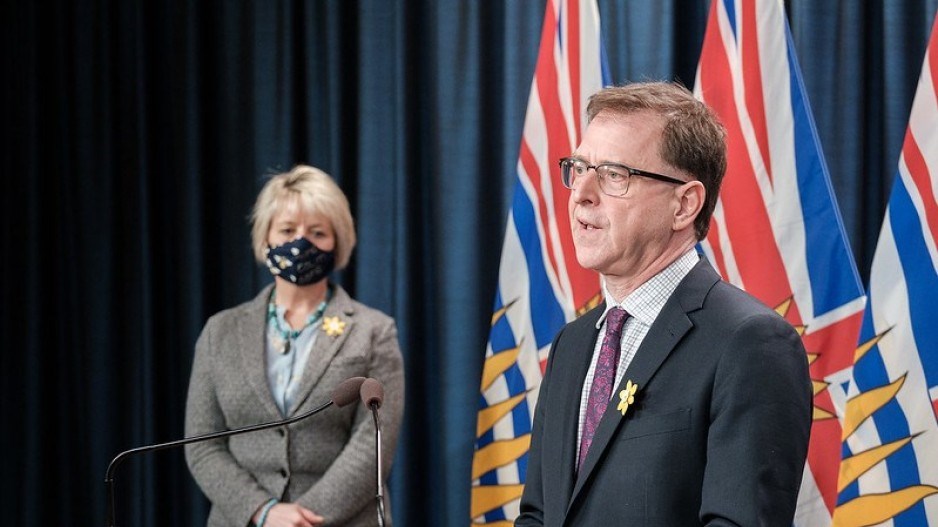The comparatively low number of new COVID-19 infections that B.C. health officials identified during the weekend may point to the province turning a corner in its seemingly never-ending battle against the pandemic.
Unfortunately, the holiday was also a deadly time for many COVID-19 patients battling for survival, as 28 additional people are now known to have passed away while infected with the SARS-CoV-2 virus, which causes COVID-19.
This raises the province's pandemic death toll to 2,029.
The deaths were spread out across the province, and they include:
• five in Fraser Health;
• three in Vancouver Coastal Health;
• eight in Interior Health;
• seven in Northern Health; and
• five in Island Health.
Having 2,090 British Columbians test positive for COVID-19 in the past four days may sound like a lot, but it works out to be an average of 522.5 people per day, which is 22% lower than the daily average during the previous week.
In the previous seven days, health officials detected 4,698 new infections, which is an average of 671.14 infections per day, or more than 28% higher than the average during the Thanksgiving weekend.
There are now 357 COVID-19 patients in B.C. hospitals, which is down by three from the previous provincial data update, on October 8. Of those, 153 are in intensive care units (ICUs) – 16 more than before the Thanksgiving weekend, and the highest number since September 22.
There are 5,183 people actively fighting COVID-19 infections, with the vast majority told to stay home and self-isolate.
In total, 194,581 British Columbians have contracted the disease since the first case was detected in the province in January, 2020.
Of those, more than 96%, or 186.955 people, are deemed by the province to have recovered.
Unvaccinated people continue to be largely responsible for much of the disease's spread despite the vast majority of British Columbians being fully vaccinated.
New government data show that between October 4 and October 10, people not fully vaccinated accounted for 68.1% of new cases. Between September 27 and October 10, people not fully vaccinated accounted for 73.7% of hospitalizations.
Across B.C., 88.8% of eligible adults older than 12 have had at least one dose of vaccine, with 82.6% of those eligible people having had two doses, according to the B.C. government.
Health officials provided 28,721 doses of vaccine to British Columbians in the past four days, with 9,734 doses going to unvaccinated individuals, and 18,987 going to those needing second doses. No data was available for any third doses, which have started to be administered to those who are considered extremely vulnerable, and immunocompromised.
Provincial health officer Bonnie Henry in September said that third doses of vaccine would be available for about 15,000 people in B.C. who are deemed most clinically vulnerable. Those people include individuals who have had organs, bone marrow or stem cell transplants, as well as those who have blood cancers and certain immune disorders.
She announced in early October that the province would be expanding its eligible group of immunocompromised people who are eligible for a third dose of the vaccine to approximately 100,000 people, who are considered moderately to severely immunocompromised.
Of the 4,117,400 B.C. residents who have received one dose of vaccine since mid-December, 2020, more than 93%, or 3,830,063, are fully vaccinated, with two doses.
The B.C. government estimated in July that the province's total population is 5,147,712, so Glacier Media's calculation is that nearly 80% of B.C.'s total population has had at least one dose of vaccine, and more than 74.4% of the province's total population has had two doses.
Glacier Media's math broke down the 2090 new infections by health region, for each 10,000 residents (with total new cases in brackets):
• 4.5 in Fraser Health (814);
• 1.8 in Vancouver Coastal Health (229);
• 5.4 in Interior Health (404);
• 11.7 in Northern Health (351); and
• 3.4 in Island Health (292).
There were no known new infections in people who normally do not reside in B.C.
The result by health region, for the 5,183 people fighting active infections, for each 10,000 residents (with total new cases in brackets) is:
• 12.1 in Fraser Health (2,182);
• 5.2 in Vancouver Coastal Health (647);
• 11.3 in Interior Health (841);
• 27.8 in Northern Health (833); and
• 7.3 in Island Health (622).
New health-care facility outbreaks have been detected at West Shore Laylum in Surrey and Evergreen Manor in White Rock. There are a total of 19 active outbreaks in health-care facilities across the province. •




